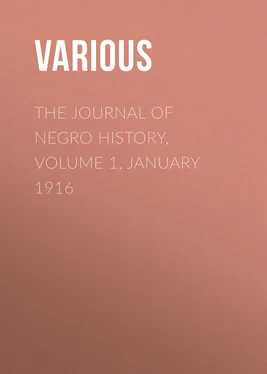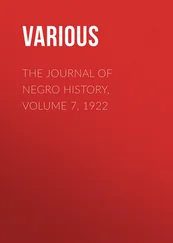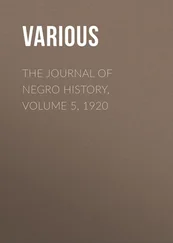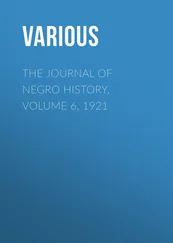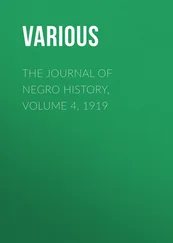Various - The Journal of Negro History, Volume 1, January 1916
Здесь есть возможность читать онлайн «Various - The Journal of Negro History, Volume 1, January 1916» — ознакомительный отрывок электронной книги совершенно бесплатно, а после прочтения отрывка купить полную версию. В некоторых случаях можно слушать аудио, скачать через торрент в формате fb2 и присутствует краткое содержание. Жанр: foreign_antique, periodic, История, foreign_edu, на английском языке. Описание произведения, (предисловие) а так же отзывы посетителей доступны на портале библиотеки ЛибКат.
- Название:The Journal of Negro History, Volume 1, January 1916
- Автор:
- Жанр:
- Год:неизвестен
- ISBN:нет данных
- Рейтинг книги:5 / 5. Голосов: 1
-
Избранное:Добавить в избранное
- Отзывы:
-
Ваша оценка:
- 100
- 1
- 2
- 3
- 4
- 5
The Journal of Negro History, Volume 1, January 1916: краткое содержание, описание и аннотация
Предлагаем к чтению аннотацию, описание, краткое содержание или предисловие (зависит от того, что написал сам автор книги «The Journal of Negro History, Volume 1, January 1916»). Если вы не нашли необходимую информацию о книге — напишите в комментариях, мы постараемся отыскать её.
The Journal of Negro History, Volume 1, January 1916 — читать онлайн ознакомительный отрывок
Ниже представлен текст книги, разбитый по страницам. Система сохранения места последней прочитанной страницы, позволяет с удобством читать онлайн бесплатно книгу «The Journal of Negro History, Volume 1, January 1916», без необходимости каждый раз заново искать на чём Вы остановились. Поставьте закладку, и сможете в любой момент перейти на страницу, на которой закончили чтение.
Интервал:
Закладка:
As a scientific study, its value is suggested by the topics emphasized, viz., "Climate," "Institutions," "Foreign Influence," "Proverbs," "Folklore," and "Writing System." Referring to the climate the author says: "In West Africa the body loses its strength, the memory its retentiveness, and the will its energy. These are the effects observed upon persons remaining in West Africa only for a short time, and they form a part of the experience of almost every person who has lived on the West Coast. White persons,–with beautiful skin, clear and soft, and with rosy cheeks,–after they have been in West Africa for a while become dark and tawny like the inhabitants of Southern Spain and Italy. If we can detect these effects of the West African climate in only a short time upon persons who come to the West Coast, what must have been the effect of such a climate upon the Negroes who for centuries have been exposed to its hardships?"
The moral life of the Vais appears to be the product of their social institutions and their severe environment. These institutions grow out of the necessities of government for the tribe under circumstances which suggest and enforce their superstitions and beliefs. This is not so with respect to education. It seems that the influence of the "Greegree Bush" (a school system) is now considerably weakened by the Liberian institutions on the one hand, the Mohammedan faith and customs on the other. So that now this institution falls short of achieving its aims, and putting its principles into practice.
The study as a whole gives evidence of the author's eight years of travel and research, and can be read with profit by all friends of mankind.
Walter Dyson.The Education of the Negro Prior to 1861 . By C. G. Woodson, Ph.D. G. P. Putnam's Sons, New York, 1915. 460 pages. $2.00 net.
The very title of Dr. Woodson's book causes one who is interested in the race history to ask questions and think. There are comparatively few people who know anything about the efforts made to educate the Negro prior to 1861. Consequently, from the first page of the book to the last, the reader is continually acquiring facts concerning this most interesting and important phase of the Colored-American's history of which he has never heard before, and some of which seem too wonderful to be true. But it is not possible to doubt anything which is found in Dr. Woodson's book. One knows that every statement he reads concerning the education of the Negro prior to 1861 is true, for the author has taken pains to substantiate every fact that he presents.
It is difficult to imagine any phase of race history more fascinating and more thrilling than an account of the desperate and prolonged struggle between the forces which made for the mental and spiritual enlightenment of the slave and those which opposed these humane and Christian efforts with all the bitterness and strength at their command. The reasons assigned by those who favored the education of the slaves and the methods suggested together with the arguments used by those who were opposed to it and the laws enacted to prevent it furnish an illuminating study in human nature.
One is surprised to find that very early in the history of the colonies there were scholars and statesmen who did not hesitate to declare their belief in the intellectual possibilities of the Negro. These men agreed with George Buchanan that the Negro had talent for the fine arts and under favorable circumstances could achieve something worth while in literature, mathematics and philosophy. The high estimate placed upon the innate ability of the Negro may be attributed to the fact that early in the history of the country there was a goodly number of slaves who had managed to attain a certain intellectual proficiency in spite of the difficulties which had to be overcome. By 1791 a colored minister had so distinguished himself that he was called to the pastorate of the First Baptist Church (white) of Portsmouth, Va. Benjamin Banneker's proficiency in mathematics enabled him to make the first clock manufactured in the United States. As the author himself says, "the instances of Negroes struggling to obtain an education read like the beautiful romances of a people in an heroic age."
Indeed the reaction which developed against allowing the slaves to pick up the few fragments of knowledge which they had been able to secure was due to some extent to the enthusiasm and eagerness with which they availed themselves of the opportunities afforded them and the salutary effect which the enlightenment had on their character. The account of the establishment of schools and churches for slaves who were transplanted to free soil is one of the most interesting chapters in the book. The struggle for the higher education shows that tremendous obstacles had been removed, before the race was allowed to secure the opportunity which it so earnestly desired. In the chapter on vocational training the effort made by colored people themselves to secure economic equality, and the determined opposition to it manifested by white mechanics are clearly and strongly set forth. In the appendix of the book one finds a number of interesting and valuable treatises, while the bibliography is of great assistance to any student of race history.
In addition to the fund of information which is secured by reading Dr. Woodson's book, a perusal of it can not help but increase one's respect for a race which under the most disheartening and discouraging circumstances strove so heroically and persistently to cultivate its mind and allowed nothing to turn it aside and conquer its will.
"The Education of the Negro Prior to 1861" is a work of profound historical research, full of interesting data on a most important phase of race life which has hitherto remained unexplored and neglected.
Mary Church Terrell.Notes
In the death of Booker T. Washington the field of history lost one of its greatest figures. He will be remembered mainly as an educational reformer, a man of vision, who had the will power to make his dreams come true. In the field of history, however, he accomplished sufficient to make his name immortal. His " Up from Slavery " is a long chapter of the story of a rising race; his " Frederick Douglass " is the interpretation of the life of a distinguished leader by a great citizen; and his " Story of the Negro " is one of the first successful efforts to give the Negro a larger place in history.
Doubleday, Page and Company will in the near future publish an extensive biography of Booker T. Washington.
During the Inauguration Week of Fisk University a number of Negro scholars held a conference to consider making a systematic study of Negro life. A committee was appointed to arrange for a larger meeting.
Dr. C. G. Woodson is now writing a volume to be entitled " The Negro in the Northwest Territory "
The Neale Publishing Company has brought out " The Political History of Slavery in the United States " by J. Z. George.
" Lincoln and Episodes of the Civil War " by W. E. Doster, appears among the publications of the Putnams.
" Black and White in the South " is the title of a volume from the pen of M. S. Evans, appearing with the imprint of Longmans, Green and Company.
T. Fisher Unwin has brought out " The Savage Man in Central Africa" by A. L. Cureau.
" Reconstruction in Georgia, Social, Political, 1865-1872" by C. Mildred Thompson, appears as a comprehensive volume in the Columbia University Studies in History, Economics, and Public Law.
The Journal of Negro History
Vol. I., No. 2 April, 1916
The Historic Background of the Negro Physician
Интервал:
Закладка:
Похожие книги на «The Journal of Negro History, Volume 1, January 1916»
Представляем Вашему вниманию похожие книги на «The Journal of Negro History, Volume 1, January 1916» списком для выбора. Мы отобрали схожую по названию и смыслу литературу в надежде предоставить читателям больше вариантов отыскать новые, интересные, ещё непрочитанные произведения.
Обсуждение, отзывы о книге «The Journal of Negro History, Volume 1, January 1916» и просто собственные мнения читателей. Оставьте ваши комментарии, напишите, что Вы думаете о произведении, его смысле или главных героях. Укажите что конкретно понравилось, а что нет, и почему Вы так считаете.
